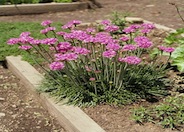
Common name:Dymondia, Rock Ditty
Botanical name:Dymondia margaretae
This foliage is gray/green/silvery; it is a very dense, mat forming groundcover. It tolerates drought, cold, salt spray and poor soils. It's deep rooted and produces small, inconspicuous yellow flowers. Rock Ditty is great for use in between stepping stones or pavers.

Common name:Curly Top Sedge
Botanical name:Carex buchananii
This orange bronze ornamental grass is 2'-3' tall and 1'-2' wide and does best in full sun to part shade. It needs moderate amount of water. Blades have gentle curls. This grass looks great when planted with green or gray colored foliage plants.

Common name:Blue Fescue, Blue Fescuegrass
Botanical name:Festuca glauca
This groundcover/grass will grow less than 1' tall and has small, blue green leaves.

Common name:Sea Pink, Common Thrift
Botanical name:Armeria maritima
This clumping, grass-like perennial is native to many areas, including coastal CA. Its flowers range from deep rose pink through white. -Monterey Bay Nursery

Common name:Lindheimer's Muhly
Botanical name:Muhlenbergia lindheimer
Native to Mexico and Texas this stunning clump forming grass is winter dormant grass in cold climates, but usually semi-deciduous in mild climates. From the fall into winter emerge the 5 ft tall upright flower inflorescence, that rise well above the blue-gray foliage. The flowers are at first purple then mature to a gray color. Best in full sun with regular watering but will tolerate drought and light shade. -Randy Baldwin
San Marcos Growers
| Designer: Rick Fisher | Dymondia Pathway |
Photographer: GardenSoft |
Soils and Compost:
Practice grass-cycling by leaving short grass clippings on lawns after mowing, so that nutrients and organic matter are returned to the soil.
Water Saving Tip:
Integrated Pest Management:
Attract, or buy beneficial insects such as ladybugs and lacewings to control pest outbreaks in your garden.

